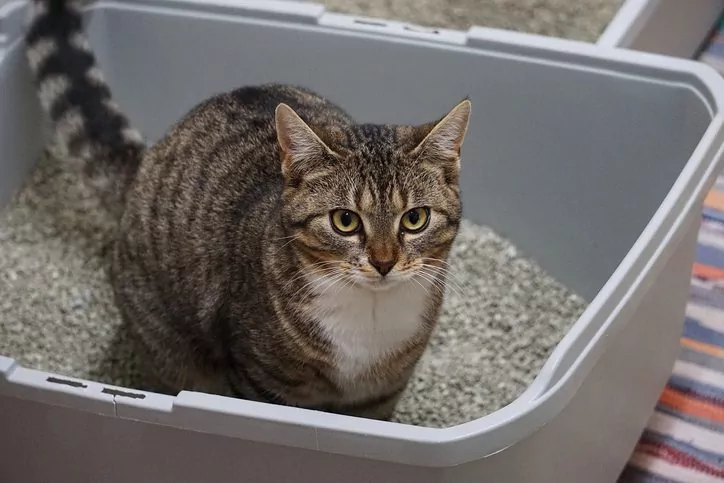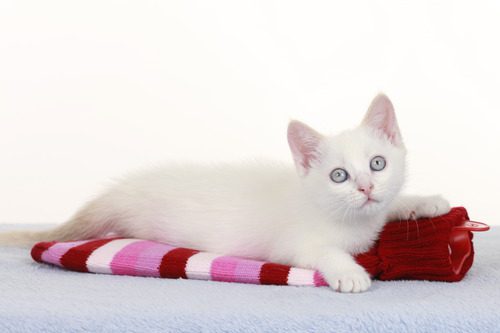Cats are usually very easy to teach to use the litter box, but there are situations that can cause them to be unwilling to use the litter box correctly. If your cat is pooping outside the litter box, you are probably in a tizzy wanting to know how to correct this behavior.
Litter box behavioral issues can be linked with some common environmental and health challenges in most cats. Knowing more about this problem can help you to avoid issues with your cat making messes all over your home or becoming completely unwilling to use the litter box at all. Being able to diagnose and attend to litter box use issues can make you and your cat both happier.

1. They Don’t Like the Smell of the Litter
Some cats are very picky about the smell of the litter that you are using, and this alone can keep them from being willing to get into the box and use it. Many cat owners are surprised at just how much of a factor this issue can be for cats. Most cats are not very picky about this, but if your cat doesn’t like certain smells, they will avoid the litter box completely until you find litter that they approve of.
There are many kinds of litter that don’t have smells associated with them as well as hypoallergenic litter that are low-dust and low-fragrance. There are also litters that come with various textures and that are made of natural or organic materials. You can try many different litter types until you find the one that your cat likes best. This is worth the trouble if your cat is not pooping in the litter box, and you might find that you and your cat both prefer the new litter that you have picked out.
2. The Box Location
Cats are very private about their time in the toilet, and if you have placed your litter box where there is too much commotion, they might not be very happy about using the box. When there are other pets in the home that might bother your cat in the litter box you could also run into issues with your pet being willing to poop inside the box.
Make sure that you locate the litter box where other pets and traffic down hallways or in busy rooms of the home will not deter your cat from using it. If you have dogs, placing the litter box where they cannot get access to the litter is also essential for their health and well-being. Dogs who ingest cat litter are at risk for intestinal blockages, which can require surgery to resolve.
3. New Pet in the Home
Sometimes if you get a new pet, you might find that your cat’s routine and behavioral patterns get upset. Cats can be very territorial about sharing things like their litter box with new cats who have moved into the house. Your cat might also be generally upset about running into the new pet in the house and might hide out, leading to accidents in the area where they have holed up due to stress.
You can usually resolve this issue by making sure that the new cat spends part of everyday locked into a room with their own litter box and food and water. This will allow the cats to make friends slowly without running into lots of conflicts. You can also add a second litter box in another location so that your cat feels like they can avoid sharing with the new cat during the phase where they are getting used to one another.
4. Health Issues
Pets with kidney problems or thyroid issues or pets with diabetes might show signs of changing litter box behavior associated with their condition. There are usually other symptoms as well in these pets, but sometimes the earliest symptom can be changes to litter box behavior.
If your pet has been refusing to use the box or they have started pooping outside the box, it can always be a good idea to get them checked out by your veterinarian. Being able to confirm a health-related reason for this change in behavior can ensure that your pet gets treatment before their condition gets more advanced. Pets that are provided supportive care for the conditions that can lead to litter box issues have much more positive outcomes than pets who are not seen by the vet to get a diagnosis.
5. Wrong Litter Box Size
Many cat owners are not aware that cats need to have a certain size litter box to be happy using the box you have provided. You will need to make sure that the box is big enough that your cat can get into it and turn around without having to step outside of the box. If you have more than one cat, you might need to add some extra real estate in the box to be sure that your cat can step into the box onto clean litter as well.
Litter box size can have a lot to do with cat behavior, and choosing a box that is too small can lead to behavioral problems.
Cats With Litter Box Issues Might be Dealing with Health Challenges or Environmental Challenges
Litter box use issues are almost always related to health problems or to changes in your cat’s environment. Make sure that you consider taking your pet to see the vet before you assume that your cat is not using the box due to a behavioral issue. There are many reasons that your pet might be refusing to use the litter box, and you will need to commit to figuring out the reason for their behavior before you give up hope. Most of these issues can be resolved quite easily if you take the time to figure out the reason behind the behavior.
Need to talk with a vet about your cat pooping outside the litter box? Call Birch Lake Animal Hospital at (651) 426-2246 or book an appointment online!
Recent Posts
About Birch Lake Animal Hospital
The staff at Birch Lake Animal Hospital seeks to provide the best possible medical care for our highly-valued patients and clients.





